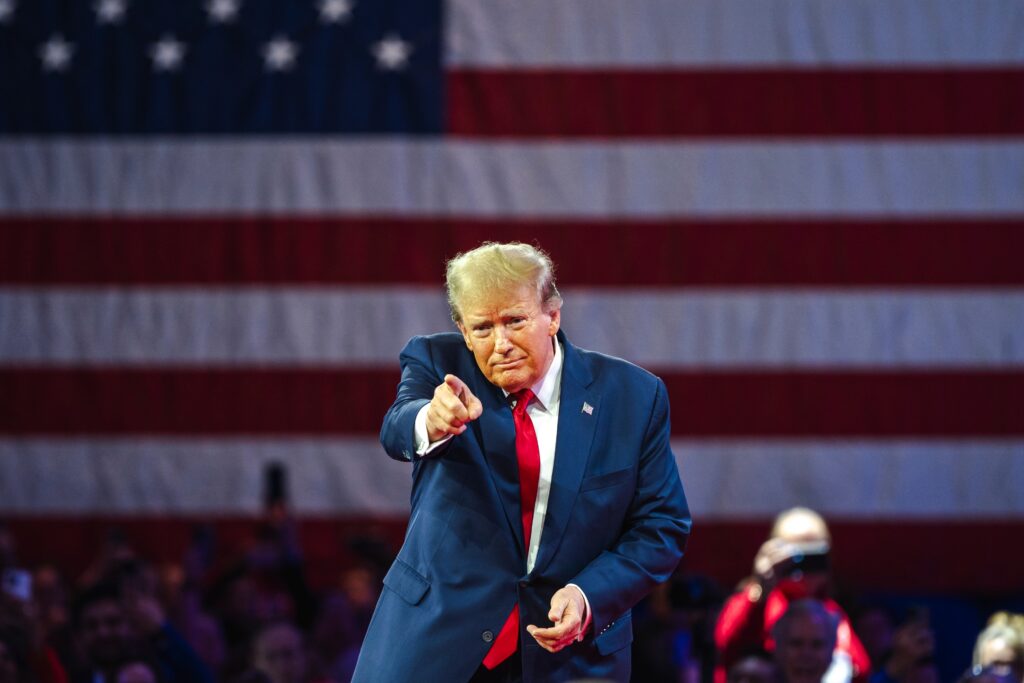President Donald Trump has ramped up his trade war rhetoric, issuing a bold warning to China over its retaliatory tariffs on U.S. goods. Trump has threatened a massive 50% import tariff on Chinese products unless Beijing cancels its 34% countermeasure on American imports. The global financial markets reacted negatively to the news, continuing their recent decline.
The Trade Tension Escalates
Last week, President Trump imposed a 34% tariff on Chinese imports as part of his “Liberation Day” policy. This policy also included a 10% minimum tariff on almost all U.S. trading partners. In response, China applied its own 34% duty on U.S. goods, triggering a sharp reaction from the White House. Trump, clearly frustrated, announced on social media Monday that China had until Tuesday to revoke its countermeasure or face a significant 50% penalty.
His administration emphasized the urgency of resolving the dispute, stressing that such tariffs could be a long-term strategy if negotiations fail to yield results. Trump made it clear that he does not intend to back down from his aggressive trade stance.
China Denounces U.S. “Economic Intimidation”
The Chinese embassy in Washington quickly condemned Trump’s actions, calling them “economic intimidation.” Officials in Beijing vowed to defend their country’s legitimate rights and interests. If Trump proceeds with his 50% tariff, U.S. duties on Chinese imports could total a staggering 104%, including the 20% levy imposed in March and the 34% duty introduced last week.
This escalating trade dispute raises concerns about a potential full-blown trade war between the world’s two largest economies. The increasing tensions have rattled financial markets worldwide, as investors worry about the broader economic impact of these tariffs.
In his social media post, Trump took a hard line, announcing that “all discussions with China regarding their meeting requests on tariffs will be immediately canceled!” He made it clear that he is unwilling to pause the tariff measures to allow for talks. Trump emphasized his focus on national interests, asserting, “We’re not stopping anything. Many countries want to strike fair agreements with us, and they will.”
Trump Criticizes China’s Countermeasures
Trump did not hold back in his criticism of China’s retaliatory measures. He accused Beijing of taking advantage of previous U.S. trade policies and warned that any retaliation would result in immediate new tariffs. “I warned clearly: any retaliation will trigger severe new tariffs without delay,” he said.
China’s response to Trump’s latest threats was firm. The Chinese embassy rejected the U.S. pressure tactics, with spokesperson Liu Pengyu stating, “Threats and pressure are not effective ways to deal with China.” This remark underscores the deeply entrenched positions both sides have taken in this trade conflict.
Economic Impact of the Trade Dispute
The impact of the escalating trade war has been felt globally, with markets showing signs of volatility. The announcement of new tariffs sent shockwaves through global financial markets, with U.S. markets experiencing sharp declines at the start of the trading week. Major European stock indices, including London’s FTSE 100, ended the day more than 4% lower. In Asia, Hong Kong’s Hang Seng index suffered a dramatic drop, falling more than 13%, marking its worst single-day loss since 1997.
The volatility extended beyond stock exchanges. Other indices, including the FTSE 100, S&P 500, DAX, and Nikkei, all showed significant declines as markets reflected the growing uncertainty about the global economic outlook.
For China, the new tariffs would pose a major challenge. The United States is a key market for Chinese exports, with products like electronics, computers, furniture, and vehicles making up a large portion of trade. China also relies on the American market for agricultural exports, including oilseeds, grains, and machinery.
New Tariff Negotiations with Other Countries
Trump’s Monday post also confirmed that new tariff negotiations with other countries would begin immediately. The president met with Israeli Prime Minister Benjamin Netanyahu at the White House, where they discussed trade imbalances between their countries. Netanyahu pledged to work quickly to eliminate Israel’s trade imbalance with the U.S. and remove trade barriers. Starting April 9, Israel will face a 17% tariff under the “Liberation Day” rules.
In addition to Israel, Trump mentioned that Japan was sending a team to the U.S. to negotiate terms for tariffs. European Commission President Ursula von der Leyen proposed a “zero-for-zero” trade deal but also warned that Europe would be ready to retaliate if necessary. “We are ready to take countermeasures and defend our rights,” she said.
Trump also accused the European Union of being designed to “harm U.S. trade interests,” reiterating his belief that the U.S. would not compromise on trade policies. The growing tensions between the U.S. and its European allies highlight the global scope of the trade disputes.
Trade Wars or Negotiations?
As the trade conflict between the U.S. and China intensifies, the global economic impact continues to unfold. Trump’s insistence on pursuing tariffs as a negotiating tool has raised questions about the future of global trade. Will the U.S. and China reach a negotiated settlement, or will the situation escalate further?
The coming days will likely be critical in determining the trajectory of this trade dispute. While Trump has made it clear that he prioritizes America’s interests, the pressure on global markets and the broader economy is mounting. Whether these tariffs lead to a long-term trade war or open the door for more constructive negotiations remains to be seen.


